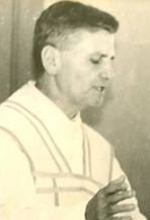
Father Joao Bosco Penido Burnier was born on June 11, 1917 in Juiz de Fora in Mato Grosso, Brazil as the fifth of nine children. He attended the Pontifical Gregorian University in Rome, graduated with a degree in theology, and was ordained a priest there in 1946. He returned home as the Assistant for Latin America in the Society of Jesus. In 1954, he was appointed the vice provincial of the province of Goiás, Minas Gerais, and Espíritu Santo. From 1959 to 1965, he held the position of novice master and spiritual director. He served as a strong advocate for the rights of indigenous populations as a member on the Indigenous Missionary Council (CIM), a partner organization of the Brazilian Conference of Catholic Bishops. He even worked as a missionary in Diamond in Minas Gerais, working with the local Bakairi and Xavante people. Much of his work took place during the military dictatorship in Brazil (1964-1985), and it was at the height of the dictatorship that Father Burnier lost his life.
On October 11, 1976, Father Burnier was returning from a meeting in Santa Terezinha with Dom Pedro Casaldáliga when he learned of the ongoing abuse of two women by police officers in the police station in Ribeirão Cascalheira. He rushed to their aid and attempted to mediate with the local authorities. However, when he attempted to do so, one of the police officers hit Father Burnier, pistol-whipped him, and shot him in the neck. The next day, October 12, Father Burnier died in the neurological center in Goiania.
Sources: http://www.prelaziasaofelixdoaraguaia.org.br/historia%20de%20joao%20bosco%20burnier.htm
http://www.cefep.org.br/divulgacao/brasil_reconhece_como_politico_assassinato_pe_burnier



